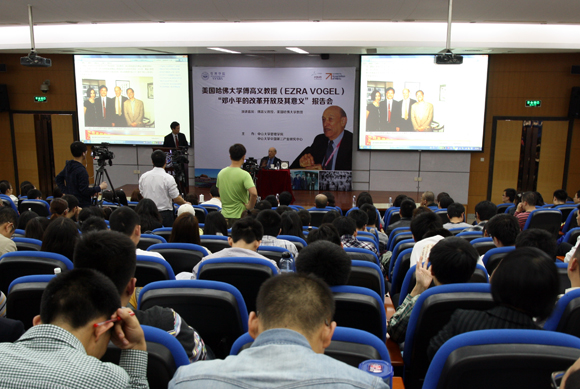Lecture on “Deng Xiaoping’s Reform and Opening-up Policy” by Professor Ezra Vogel from Harvard University successfully held
Source: School of Business, China Center for Service Sector Research
Written by: School of Business, China Center for Service Sector Research
Translated by: Yu Jingbing
Edited by: Wang Dongmei
On the afternoon of April 2, Professor Ezra Vogel from Harvard University gave a lecture entitled “Deng Xiaoping’s Reform and Opening-up Policy” in the School of Business. Li Zhongfei, Executive Dean of the School of Business, Li Jiangfan, Director of the China Center for Service Sector Research, and hundreds of teachers and students attended the lecture.
Executive Dean Li Zhongfei warmly welcomed the visit of Professor Vogel on behalf of the School of Business, briefly introduced Professor Vogel and the basic situation of the School, wished the lecture a great success, and presented souvenirs to Professor Vogel.

The lecture was organized by a stream of old photos that recorded Deng Xiaoping in different historical periods. Professor Vogel summarized Deng Xiaoping’s political influence at different times through demonstrating photos, during which he spiced the lecture with plenty of anecdotes. One of the pictures captured the moment when Deng Xiaoping put on the hat presented by a cowgirl in 1979 during his visit in the United States. This photo changed many American people’s preconceptions about Deng Xiaoping. Professor Vogel also summed up the three most important things that can be learnt from Deng Xiaoping’s reform and opening-up policy: first, collaborate with foreign countries; second, learn from the world about how to reform and open up; third, cultivate capable talents. Professor Vogel used Chinese all the way through his speech. The American scholar in his eighties was energetic and humorous.
During the Q&A session, the audience enthusiastically asked questions and Professor Vogel gave detailed and meticulous response. He said that he would consider asking students to take over the task if he would write about other historical figures in the future. Speaking of the future development, he took the view that China and the United States should collaborate and pull together in times of trouble. In terms of the opportunities for development in Guangdong Province, he thinks that Guangdong’s competitive edge in market economy is not as obvious as in the 1980s when China started to establish special economic zones because other provinces now can open their economies to market forces as well. However, Guangdong’s advantage in export still lies in the fact that it’s adjacent to Hong Kong and Macao. Therefore, Guangdong should persevere in reform and opening-up. He also had in-depth discussions with the audience on issues such as giving consideration to both economic development and social issues, Deng Xiaoping’s thoughts on political reform, the importance of Deng Xiaoping’s Southern Tour Speeches, etc.
In 2000, the 70-year-old professor retired from Harvard University and planned to write a book to help American people know China better. He thinks that the China-US relation is essential to world peace in the 21st century. Deng Xiaoping is a key figure who most influenced the course of modern China. Therefore, Professor Vogel chose to analyze Deng Xiaoping in his book. He said that as a foreigner, he had three advantages in writing about Deng Xiaoping: firstly, “the onlooker sees most of the game”, he could take an objective view of the issues in China. Secondly, he could have access to richer source of materials than domestic scholars. Thirdly, he took advantage of his identity as a Harvard scholar to get to know a lot of people who had contact with Deng Xiaoping. Speaking of this, he teased himself as someone who “exploits connections”. As a Harvard scholar, he visited figures at the time of Deng Xiaoping, studied for ten years and finally completed the book Deng Xiaoping and the Transformation of China. It is reported that the Chinese version of the book was publicly issued in January, 2013 in China, and rough statistics suggest that it has sold nearly 500,000 copies.
